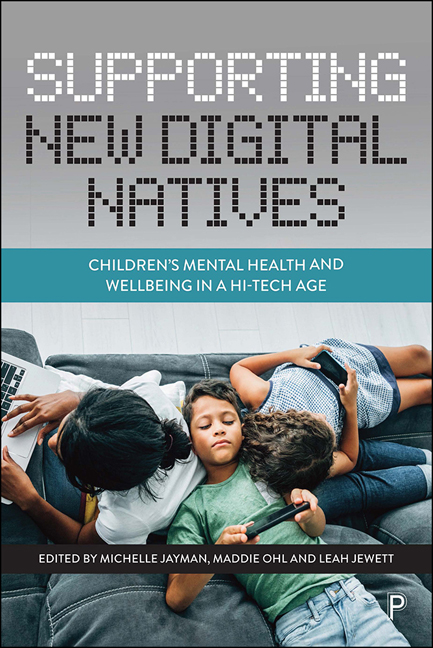Book contents
- Frontmatter
- Dedication
- Contents
- List of figures and tables
- Glossary
- Notes on contributors
- Foreword
- Preface
- 1 Digital lives: growing up in a hi-tech world and staying mentally healthy
- 2 Pyramid Club: building skills for healthy friendships and relationships in a digital age
- 3 Supporting children’s healthy socio-emotional development through play: Book of Beasties – the mental wellness card game
- 4 The School Counselling Partnership: providing support and promoting self-care for school communities
- 5 The Breeze Project: supporting children and young people through Forest School
- 6 Promoting the mental health of girls and young women in the community: the role of Girlguiding
- 7 Supporting families to navigate the changing sex-education landscape: Outspoken Sex Ed
- 8 The Lift Off programme by Red Balloon: online learning and wellbeing support for children who self-exclude from school
- 9 The LifeMosaic project: supporting wellbeing and empowering pupils through design, development and research
- 10 Building better mental wellbeing for children: rebel thinking and innovative practice
- Index
1 - Digital lives: growing up in a hi-tech world and staying mentally healthy
Published online by Cambridge University Press: 13 May 2022
- Frontmatter
- Dedication
- Contents
- List of figures and tables
- Glossary
- Notes on contributors
- Foreword
- Preface
- 1 Digital lives: growing up in a hi-tech world and staying mentally healthy
- 2 Pyramid Club: building skills for healthy friendships and relationships in a digital age
- 3 Supporting children’s healthy socio-emotional development through play: Book of Beasties – the mental wellness card game
- 4 The School Counselling Partnership: providing support and promoting self-care for school communities
- 5 The Breeze Project: supporting children and young people through Forest School
- 6 Promoting the mental health of girls and young women in the community: the role of Girlguiding
- 7 Supporting families to navigate the changing sex-education landscape: Outspoken Sex Ed
- 8 The Lift Off programme by Red Balloon: online learning and wellbeing support for children who self-exclude from school
- 9 The LifeMosaic project: supporting wellbeing and empowering pupils through design, development and research
- 10 Building better mental wellbeing for children: rebel thinking and innovative practice
- Index
Summary
Introduction
Children in the early decades of the 21st century are growing up in a social world remarkably different from that of their parents or grandparents. While every generation is transitory by nature, a uniquely striking feature for children living in contemporary society is the proliferation of digital technologies and the unprecedented pace and scale of change such technologies bring. The opportunities and benefits afforded those born into a digitally rich environment are immense and can have a positive impact on many important areas of children's lives including education and learning, play and creativity, and relationships and social connectivity. However, casting a shadow over this vision of techno-utopia is a cloud of associated risks and potential harms which appear in guises unique to a digital environment, for example cyberbullying, online sexual exploitation and access to distressing content. While not all children are exposed to digital technologies equally, the modern world is constantly changing in complex ways, and digital technologies are an integral part of this shifting landscape. An increasingly interconnected digital world requires children to learn the skills and be given the support to navigate the complexities of a hi-tech environment and to feel safe and happy to live, learn and play within it. This book is concerned with how children can live mentally healthy lives, meeting the challenges inherent in a society increasingly dominated by digital technologies, while also harnessing the abundance of great opportunities this has to offer.
The original ‘digital natives’ became young adults at the beginning of the 21st century. This book addresses a younger generation of ‘new digital natives’ – today's children – whose formative experiences are shaped by a social world saturated with digital technologies. International research suggests that the use of digital technologies has increased exponentially worldwide while the age of first access continues to drop (Gottschalk, 2019). In the United Kingdom, 50 per cent of ten-year-olds owned a smartphone in 2019 (Ofcom, 2019) and the average age of first mobile ownership was seven (Childwise, 2020). Patterns of usage are also shifting. In 2018, ‘tweens’ (aged 9 to 12) reported digitally active lives resembling those of teenagers recorded just three to four years earlier (Chaudron et al, 2018).
- Type
- Chapter
- Information
- Supporting New Digital NativesChildren's Mental Health and Wellbeing in a Hi-Tech Age, pp. 1 - 22Publisher: Bristol University PressPrint publication year: 2021



